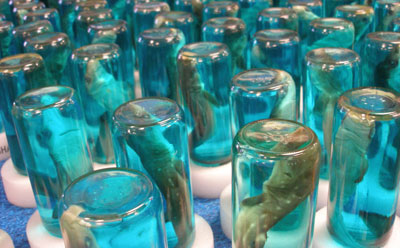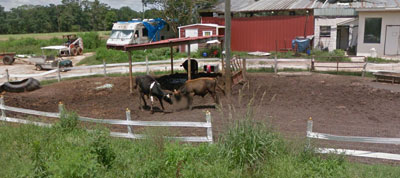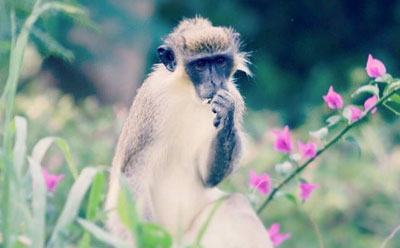August 19, 2014 | News & Information
According to a recent article in the New York Times, biologists in Florida consider the tegu to be the “most troublesome invasive species in the Everglades.” The lizards arrived in Florida through the pet trade. The tegus in the Everglades are descended from released or escaped pets.
The National Reptile Breeders’ Expo concluded on Sunday in Daytona Beach. It’s one of the largest reptile industry shows in the country. Many of the vendors at the show, including Snakes at Sunset (Miami) and Underground Reptiles (Deerfield Beach), offer tegus for sale.
The Florida Fish & Wildlife Conservation Commission (FWC) is negligent in allowing the breeding and sale of tegus.
You Can Help
It is illegal to buy or sell Burmese pythons as pets in Florida. The FWC has proposed a ban on the breeding of lionfish, another animal of concern (it is already prohibited to import lionfish into Florida). Please ask the FWC to also act to stop the breeding and sale of tegus as pets in Florida.
Florida Fish and Wildlife Conservation Commission
Email: Commissioners@MyFWC.com
Online comment form.
June 24, 2014 | News & Information
This week, Miami New Times reported on t-shirt shops selling dead baby sharks as souvenirs. The sharks, by-products of the commercial fishing industry, are preserved inside bottles of blue alcohol/water solution.
We don’t know why a tourist would be interested in buying the body of a dead shark. The items have been sold in tourist shops in Florida and across the country for years, but New Times reported that they may be losing their appeal. A manager at one store in Miami Beach told the paper, “We’re getting rid of them because so many people have complained.”

One of the biggest retailers of the bottled dead sharks is Alvin’s Island, a chain with 12 stores in Florida. Please contact Alvin’s Island and ask them to stop selling bottled sharks in their stores. Contact:
Eliezer Tabib, President
Alvin’s Island
Phone: (305) 471-9394
Email: eliezertabib@marcodestin.net
Online comment form.
One source of the bottled dead sharks is a Fort Lauderdale-based company, Holiday Souvenirs. Please contact the company and ask them to no longer sell bottled shark souvenirs. Contact:
Manuel and Barbara Pascal
Holiday Souvenirs
Phone: (800) 521-4302 or (954) 564-6134
Email: hsshells@bellsouth.net, info@holidaysouvenirs.com
Sharks are magnificent creatures who are essential to the ocean ecosystem, but shark populations are dwindling around the world.
May 1, 2014 | News & Information
 When bears in Florida act aggressively or attack humans, as happened on April 12 when a woman was seriously injured by a bear outside her home in Lake Mary, the incidents are often linked to food. In the Lake Mary neighborhood where the attack occurred, bears were known to go through residents’ trash looking for food. A Florida Fish & Wildlife Conservation Commission (FWC) spokesman described the bears in the area as “food-conditioned” and said they had lost their fear of humans.
When bears in Florida act aggressively or attack humans, as happened on April 12 when a woman was seriously injured by a bear outside her home in Lake Mary, the incidents are often linked to food. In the Lake Mary neighborhood where the attack occurred, bears were known to go through residents’ trash looking for food. A Florida Fish & Wildlife Conservation Commission (FWC) spokesman described the bears in the area as “food-conditioned” and said they had lost their fear of humans.
Rep. Mike Clelland, who represents Seminole County neighborhoods that have seen recent bear attacks, has suggested requiring residents to use bear-resistant garbage cans. We think this is a great idea. Using bear-resistant garbage cans, along with taking in bird seed and other food items overnight, is a proven effective method of reducing conflicts.
Unfortunately, last week, in a letter sent to the FWC, a group of state lawmakers– Representatives Ben Albritton, Frank Artiles, Halsey Beshears, Jim Boyd, Jason Brodeur, Matt Caldwell, Katie Edwards, Eric Eisnaugle, J.W. Grant, Doug Holder, Ritch Workman and Dana Young– called for a return to bear hunting.
Hunting does not reduce human-bear conflicts. Most conflicts occur in residential neighborhoods where hunting would not be allowed. Rep. Clelland, a voice of reason, explained to the Orlando Sentinel, “It’s not the number of bears that we’re most concerned about — it’s bears interacting with humans. The reason they’re interacting with humans is trash. We can solve that problem with bear-proof cans, not guns.”
Bears were last hunted in Florida in 1993. Although bear populations have increased since hunting was stopped, there are still only approx. 3,000 bears statewide. ARFF will continue to work to make sure bears in Florida remain safe from hunter’s bullets.
March 19, 2014 | News & Information
In late February, three managers at a dairy farm in northern Florida (Jackson County) were arrested after an inspector from the Florida Department of Agriculture found unsanitary conditions and 90 cows suffering from neglect. The inspector reported bluntly, “these animals were not being fed.”
Joe D. Clark, Richard K. Clark and Nikki Slininger, managers at Wild Rose Dairy, were charged with felony animal cruelty and unlawful disposal of animal carcasses (two dead cows were also found on the property).

Wild Rose Dairy in Graceville, Florida
ARFF is encouraged that felony charges have been filed in this case. Too often, “farm animals” are not provided the protection they deserve in the courts.
Please contact the State Attorney for Jackson County and urge him to take this case seriously, and if the three individuals are found guilty, to press for the maximum penalty.
Glenn Hess, State Attorney
14th Judicial Circuit of Florida
P.O. Box 956
Marianna, FL 32447
Phone: (850) 482-9555
Fax: (850) 482-1383
ARFF recommends that people wishing to reduce animal suffering minimize or, better yet, eliminate dairy and other animal products from their diet. Visit ARFF’s website to learn more about the dairy industry, or click here to download ARFF’s dairy brochure.
February 20, 2014 | News & Information
 On Saturday, February 22, Monkey Jungle in Miami will host an “African Ape Awareness Festival” featuring talks by conservationists, dance and drama performances, and a fashion show. The goal of the festival is to raise awareness of endangered chimpanzees and gorillas in Africa. But there is one African ape closer to home who deserves greater public awareness.
On Saturday, February 22, Monkey Jungle in Miami will host an “African Ape Awareness Festival” featuring talks by conservationists, dance and drama performances, and a fashion show. The goal of the festival is to raise awareness of endangered chimpanzees and gorillas in Africa. But there is one African ape closer to home who deserves greater public awareness.
For 25 years a gorilla named King has lived a solitary existence at Monkey Jungle. Of the approximately 360 gorillas in zoos in the United States, King may be the only one who lives alone and who has no prospect of ever having a companion*.
In March 1989 a female gorilla named Mitzie died at Monkey Jungle. Since then, King has remained alone–despite the efforts of animal advocates.
In 1997, a campaign was launched to persuade Monkey Jungle to send King to Zoo Atlanta, where he could be with other gorillas. But despite Zoo Atlanta’s invitation and pleas from noted primatologist Jane Goodall and thousands of Florida residents, Monkey Jungle refused.
Instead, after languishing for years in a concrete-and-bars cage, in 2001 Monkey Jungle built a naturalistic enclosure where King is at least able to feel the sun and breath fresh air. Although the larger enclosure was an improvement, it is unclear how much time King actually spends in the enclosure, and Monkey Jungle continues to ignore the issue that King is alone. Gorillas and other apes are intelligent animals with complex social and emotional lives.
During King’s daily shows at Monkey Jungle, he performs degrading tricks such as the Hokey-Pokey for the amusement of tourists. King will turn 45 this year.
Please ask Monkey Jungle to transfer King to a respected zoo where he could live out the remainder of his life with companionship and dignity. Contact:
Monkey Jungle
14805 Southwest 216th Street
Miami, FL 33170
Phone: (305) 235-1611
Email: mjungle@bellsouth.net
*Monkey Jungle lost its American Zoo and Aquarium Association-accreditation years ago and therefore does not qualify to receive another gorilla.
February 6, 2014 | News & Information
According to preliminary U.S. Fish and Wildlife Service records, in 2013 there was not a single monkey exported from St. Kitts & Nevis into the United States. With this unexpected good news, ARFF is renewing our call for a permanent end to the export of wild monkeys for experimentation.
2013 was the first in at least 20 years that no animals were exported from St. Kitts & Nevis. In 2012, 164 monkeys were trapped, stuffed into wooden crates and flown off the islands. (It appears that there hasn’t been a shipment since November 2012 when 44 monkeys arrived in Miami.)

African green, or “vervet” monkey in St. Kitts
St. Kitts & Nevis is one of only a handful of countries, including Barbados and Mauritius, that allows the trapping and export of wild monkeys for use in laboratory experimentation.
You can Help! Please contact the Prime Minister and politely ask for a ban on the export from St. Kitts & Nevis of monkeys destined for the research industry.
The Honorable Dr. Denzil L. Douglas
Prime Minister of St. Kitts & Nevis
Email: sknpmoffice@sisterisles.kn
Online comment form.
Please send a copy of your comments to the St. Kitts Tourism Authority.
Racquel Brown, Acting CEO
St. Kitts Tourism Authority
Email: info@stkittstourism.kn
Online comment form.
Visit Stolen from Paradise.com for a sample letter and to learn more about ARFF’s campaign.





